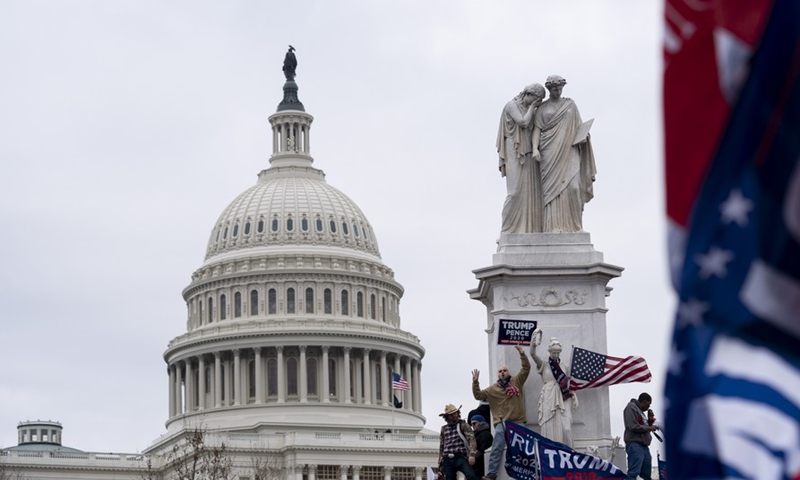
Supporters of U.S. President Donald Trump gather near the U.S. Capitol building in Washington, D.C., the United States, Jan. 6, 2021. (Xinhua/Liu Jie)
The turmoil on Capitol Hill has caused concerns in many parts of the so-called democratic world. In Australia, for example, there have been concerns that the turmoil in the US will have a negative impact on Australian society,drawing it into vicious partisanship. Sydney Morning Herald published an article on January 8 saying “perhaps [the world] should try to think about making the world safe from America.”
While leaders around the world have condemned the unrest in the US, the Australian government has been relatively ambivalent. When the symbol of democracy in the Western world was challenged, the Australian government has had little reaction. This reflects the double standards that Australia and the Trump administration have agreed to. However, now there are voices in Australia who worry that the turmoil in the US will have a negative impact on their own country. This shows that the US, as the “center” of the democratic world, is now being questioned by the world.
The Capitol riots didn’t happen in isolation. It was part of a movement that began on November 3 to overturn the results of the US presidential elections and try to give Trump a second term. The so-called democratic world should now rethink two questions: First, what is the purpose of democracy? The very nature of the turmoil on the Capitol Hill reflects that the purpose of the US democracy is to satisfy its people’s personal interest rather than a united will to make the country a greater one. Second, is freedom a group concept or an individual concept? The West tends to put individual freedom above all values, but freedom itself is a group concept. If freedom has no boundaries, conflict between people is inevitable. If freedom has boundaries, are they expressed differently in different social systems and different countries?
The US was once called “the beacon of the world.” Truth to be told, all social systems have their own strengths and weaknesses, and there is no such thing as a "beacon" or a single model to copy. In the 1960s, there was explicit discrimination against black people in the US. Now it has become an implicit discrimination, and even Americans themselves think it is a systematic problem. Could such a country be called a “beacon”? The US system has its strengths and has made a lot of contributions to human society. However, like the Chinese system and the Arab system, there are places for other countries to learn from. Human civilization has no template, nor a consistent standard, which determines that the world will not follow on the direction of the US.
The US is at a historic crossroads, and this political civil war shows the US will be locked in a struggle between the “left” and the “right” for a long time. It also means that the “Trumpism” will not die out with the transfer of power, which may bring challenges to the democratic system. However, as the concept of sovereign equality of nations solidifies, it is unlikely that other democracies will follow the suit of the US. When the United Nations was founded in 1945, it had only50 members and today it has 193 members, most of which are former colonies. The world used to be about "leading" and "being led,” but now and in the future, there will be no such relationship between nations. The internal strife in the US this time has exacerbated the decline of its soft power, while also let the world see the social disruption caused by Trumpism.
Populism and xenophobia are on the rise in many Western countries, but the reality of US civil strife has sounded an alarm. There have been similar riots in some developing countries in the past, and the so-called democracy countries were gloating over the chaos. Now chaos is happening at the very heart of the West, forcing it to start thinking about the red lines of democracy. The world should now agree that for whatever purpose, violence is a violation of the law.
However, populism, xenophobia, and white supremacy will continue to exist and may become even worse in Western democracies but are unlikely to inherit the “Trumpism,” as they have seen the rifts it has created and how hard they are to heal. That is to say "Trumpism" will not spill over, and even if it is extended or inherited, it will stay in the US.
The author is a senior research fellow at the China Institute of International Studies. opinion@globaltimes.com.cn
